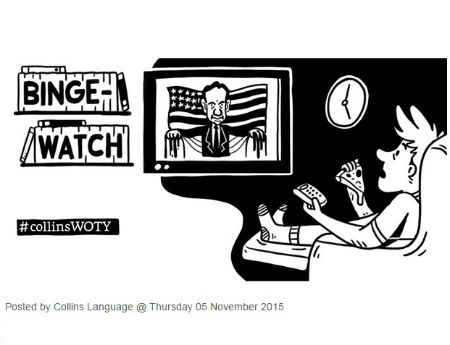Word Up

The smarter way to stay on top of the multichannel video marketplace. Sign up below.
You are now subscribed
Your newsletter sign-up was successful
If you didn’t already realize it, binge-watching is a thing now. And, just this week, it became a more official thing.
Thanks to growing popularity of OTT services like Netflix and in “recognition of the fact that 2015 was the year our television viewing finally became totally unshackled by time and place,” Collins English Dictionary has selected “binge-watch” as its Word of the Year, beating out entries such as “clean eating” and “dadbod” for the linguistic crown.
In its etymology of binge-watch (meaning, of course, to watch a large number of television shows in succession), Collins notes that the core word “binge” was originally a Lincolnshire dialect word meaning “to soak” that came into general use in the 19th century. It’s since been applied to other excessive behavior, such as binge-eating or binge-drinking.
With access to full seasons of shows and series such as Breaking Bad, House of Cards, and Orange is the New Black, allowing us to watch episodes back-to-back-to-back-to-back, that behavior has successfully bridged itself to the world of video and TV.
A “dramatic increase in usage” established binge-watch’s pole position this year, Collins noted.
Here are the other words that, per Collins, have been “catapulted into the dictionary” this year:
-Clean eating (noun): Following a diet that contains only natural foods, and is low in sugar, salt, and fat.
The smarter way to stay on top of the multichannel video marketplace. Sign up below.
-Contactless (adjective): Payments, smart cards, etc. that utilize RFID (radio-frequency identity) technology and do not require a PIN or signature from the customer.
-Corbynomics (noun): the economic policies advocated by the UK Labour leader Jeremy Corbyn.
-Dadbod (noun): an untoned and slightly plump male physique, especially one considered attractive.
-Ghosting (noun): Ending a relationship by ignoring all communication from the other person.
-Manspreading (noun): The act or an instance of a male passenger in a bus or train splaying his legs in a way that denies space to the passenger sitting next to him.
-Shaming (noun): Attempting to embarrass a person or group by drawing attention to their perceived offence, especially on social media.
-Swipe (verb): to move a finger across a touchscreen on a mobile phone in order to approve (swipe right) or dismiss (swipe left) an image.
-Transgender (adjective): Of or relating to a person whose gender identity does not fully correspond to the sex assigned to them at birth.
